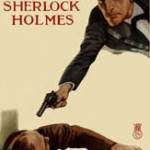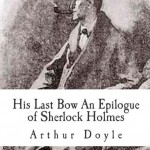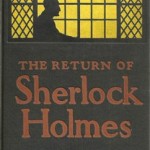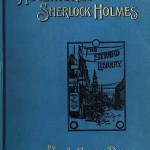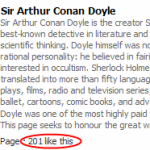“Well, Mrs. Lucca,” said the prosaic Gregson, laying his hand upon the lady’s sleeve with as little sentiment as if she were a Notting Hill hooligan, “I am not very clear yet who you are or what you are; but you’ve said enough to make it very clear that we shall want you at the Yard.”
“One moment, Gregson,” said Holmes. “I rather fancy that this lady may be as anxious to give us information as we can be to get it. You understand, madam, that your husband will be arrested and tried for the death of the man who lies before us? What you say may be used in evidence. But if you think that he has acted from motives which are not criminal, and which he would wish to have known, then you cannot serve him better than by telling us the whole story.”
“Now that Gorgiano is dead we fear nothing,” said the lady. “He was a devil and a monster, and there can be no judge in the world who would punish my husband for having killed him.”
“In that case,” said Holmes, “my suggestion is that we lock this door, leave things as we found them, go with this lady to her room, and form our opinion after we have heard what it is that she has to say to us.”
Half an hour later we were seated, all four, in the small sitting-room of Signora Lucca, listening to her remarkable narrative of those sinister events, the ending of which we had chanced to witness. She spoke in rapid and fluent but very unconventional English, which, for the sake of clearness, I will make grammatical.
“I was born in Posilippo, near Naples,” said she, “and was the daughter of Augusto Barelli, who was the chief lawyer and once the deputy of that part. Gennaro was in my father’s employment, and I came to love him, as any woman must. He had neither money nor position–nothing but his beauty and strength and energy–so my father forbade the match. We fled together, were married at Bari, and sold my jewels to gain the money which would take us to America. This was four years ago, and we have been in New York ever since.
“Fortune was very good to us at first. Gennaro was able to do a service to an Italian gentleman–he saved him from some ruffians in the place called the Bowery, and so made a powerful friend. His name was Tito Castalotte, and he was the senior partner of the great firm of Castalotte and Zamba, who are the chief fruit importers of New York. Signor Zamba is an invalid, and our new friend Castalotte has all power within the firm, which employs more than three hundred men. He took my husband into his employment, made him head of a department, and showed his good-will towards him in every way. Signor Castalotte was a bachelor, and I believe that he felt as if Gennaro was his son, and both my husband and I loved him as if he were our father. We had taken and furnished a little house in Brooklyn, and our whole future seemed assured when that black cloud appeared which was soon to overspread our sky.
“One night, when Gennaro returned from his work, he brought a fellow-countryman back with him. His name was Gorgiano, and he had come also from Posilippo. He was a huge man, as you can testify, for you have looked upon his corpse. Not only was his body that of a giant but everything about him was grotesque, gigantic, and terrifying. His voice was like thunder in our little house. There was scarce room for the whirl of his great arms as he talked. His thoughts, his emotions, his passions, all were exaggerated and monstrous. He talked, or rather roared, with such energy that others could but sit and listen, cowed with the mighty stream of words. His eyes blazed at you and held you at his mercy. He was a terrible and wonderful man. I thank God that he is dead!
“He came again and again. Yet I was aware that Gennaro was no more happy than I was in his presence. My poor husband would sit pale and listless, listening to the endless raving upon politics and upon social questions which made up our visitor’s conversation. Gennaro said nothing, but I, who knew him so well, could read in his face some emotion which I had never seen there before. At first I thought that it was dislike. And then, gradually, I understood that it was more than dislike. It was fear–a deep, secret, shrinking fear. That night–the night that I read his terror–I put my arms round him and I implored him by his love for me and by all that he held dear to hold nothing from me, and to tell me why this huge man overshadowed him so.
“He told me, and my own heart grew cold as ice as I listened. My poor Gennaro, in his wild and fiery days, when all the world seemed against him and his mind was driven half mad by the injustices of life, had joined a Neapolitan society, the Red Circle, which was allied to the old Carbonari. The oaths and secrets of this brotherhood were frightful, but once within its rule no escape was possible. When we had fled to America Gennaro thought that he had cast it all off forever. What was his horror one evening to meet in the streets the very man who had initiated him in Naples, the giant Gorgiano, a man who had earned the name of ‘Death’ in the south of Italy, for he was red to the elbow in murder! He had come to New York to avoid the Italian police, and he had already planted a branch of this dreadful society in his new home. All this Gennaro told me and showed me a summons which he had received that very day, a Red Circle drawn upon the head of it telling him that a lodge would be held upon a certain date, and that his presence at it was required and ordered.

